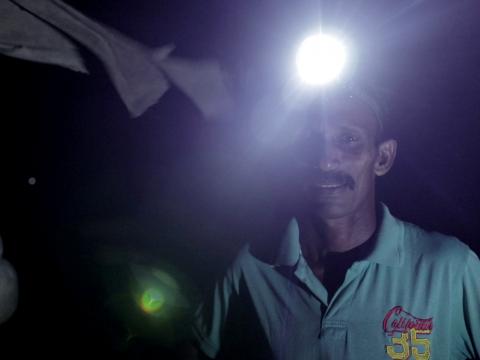Subash's life saver

For Subash, boat was his life. A boat helped him adapt to a new normal when he was only 14. A boat found him friends and a livelihood. A boat was their safe bunker during the war. A boat carried him to India as a refugee. And a boat gave him strength to rebuild life after the brutal war.
Subash was still small when his father decided to move their family from Kandy (Central Sri Lanka) to Mullaitivu (North Sri Lanka), over a disagreement with his brother. They were doing well until then. He took the family 250 km away from everything that was familiar. The new surrounding was alien to Subash including the language, food and terrain.
But a boat gave him friends. "I was only 14 years old when I started fishing," Subash recalls, "No one in my family had ever done fishing so I learnt on my own with friends."
"In the beginning we used normal Catamaran. We roped together the logs of cotton trees to build a catamaran. It doesn’t have an engine and we had no motor either. We paddled Catamaran by hand to a nearby sea area," Subash says. He grew with the boats.
"Then came a model that looks like a raft and made of plastic. That was available in Udappu, Puttalam (North West Sri Lanka). Not everyone was able to travel over there at that time. So those who could travel, would buy a raft. It enabled to go bit far into the sea than before," he explains.
"From there we moved to a motor boat. A person called Amalan guided us in our work but he died in the tsunami," he says.
His life continued amidst hostilities and after he completed his Advanced Level he fled to India as a refugee on board Akbar – a passenger ship. His hope was to continue studies when he got there, but he had no money. A year and a half later they returned home and returned to fishing.
"When the hostilities restarted, I continued to fish, when the war intensified, we buried the boat and made a bunker keeping coconut logs on top," he says, "I used the raft with my friend to go fishing when possible. We survived the war living in the bunker for two years."
"When we fled during the war, I packed everything in two blue suitcases we had received after tsunami," Subash says, "my wife’s jewellery, birth certificates, marriage certificate and other important documents and my NIC in one suitcase and our clothes in the other."
"My youngest was 40 days old and my wife was still recovering after the caesarean delivery. My mother was paralysed. So I had to take her on one hand and my youngest in the other. The other two children could manage to walk with their bags" Subash explains, "I didn’t notice that in our rush we had carried only one suitcase – the one with the clothes - until we unzipped it at the army checkpoint on the other side of the lagoon. The war kept continuing and we were sent to Chettikulam, Vavuniya. We lost everything."
Subash and his family returned home in 2011. The boats had got burnt in the war. He returned to fishing with his friend using the raft determined to rebuild his life.
"If I earn 5/= I spend 2/= and saved 3/= Little by little I saved more money and bought few pieces of different varieties of fishing nets," then our fisheries society informed us about a Project by World Vision and John Keells Foundation that were providing boats and equipment to improve our livelihood."
"The organizations visited and saw our condition," he says, "If we had a decent catch one day, next four days we didn’t and there were days we couldn’t even earn enough to buy kerosene expenses."
"When I first took the boat they gave me into the sea, I felt like we have won a country," Subash smiles, "I visited the temples on the shore in the boat itself before I started fishing in it. My entire family was there when I first took the boat to the sea. We took pictures too.
"My children study very well. My eldest is married and my second is just entering university. My third is in grade seven. It is with their support that I push the boat into the sea, pull it to shore when I return and sort the catch."
"This boat is like a fourth child," he says "I can’t describe enough all that it has done for me already. All that I have now and everything I provide for my wife and three daughters is because of this boat."
